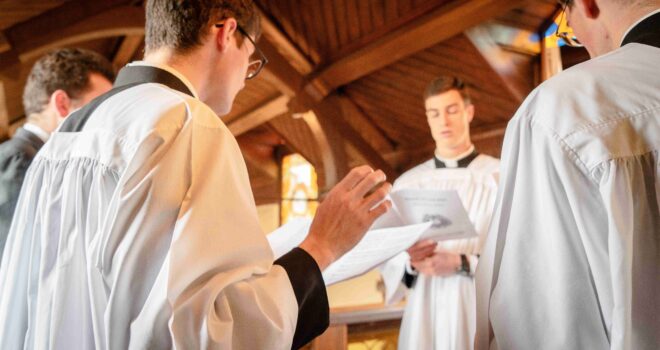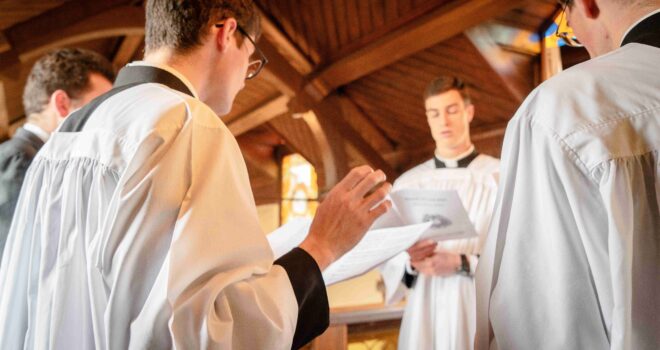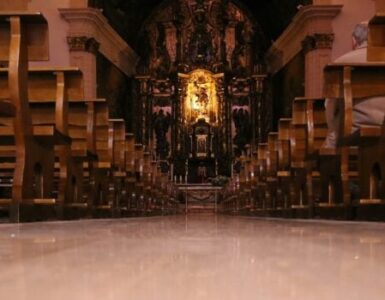Acts 2:14, 36-41; 1Pet 2:20-25; Jn 10:1-10
I was rather taken aback by the response I received from a friend when I told her that I was going to the seminary to begin my priestly and religious formation. She said to me something like this, “Catholic priesthood in this time of the most repulsive clergy sexual abuse and cover-up scandals? Don’t you have anything better to do with your life? Besides, do you think you are ready for the sacrifices, challenges, and difficulties of the priesthood?” Talk about a downer!
There is no wonder we have few religious and priestly vocations today when there are people who have such negative and pessimistic views of the consecrated life and Catholic priesthood. Even if they claim to be praying for religious and priestly vocations, can their prayers be effective when they have nothing but disdain and contempt for the vocations? We cannot inspire young men and women to the priesthood and religious life when we focus and highlight only the challenges, sacrifices, obstacles, failures, and trials of the priesthood and religious life.
We can begin to reclaim the beauty and dignity of the priestly and religious vocation when we begin to grasp the meaning of the death and resurrection of Jesus Christ for each one of us. The death and resurrection of Jesus Christ are not just facts to be believed but we must also be deeply convinced of the personal gains that are ours from this paschal mystery.
Firstly, Jesus Christ is now the Lord of our lives.
St. Peter reminded his audience after Pentecost that the death and resurrection of Jesus should greatly impact their choices in life, “Let the whole house of Israel know for certain that God has made both Lord and Christ, this Jesus whom you crucified.” We are no longer the lords of our lives or our beings but we are now to focus on doing His will and pleasing Him alone. We belong to Him now and in eternity, “None of us lives to himself, and none of us dies to himself. If we live, we live to the Lord, and if we die, we die to the Lord; so then, whether we live or whether we die, we are the Lord’s.” (Rom 14:7-8)
Thus, we do not choose our vocations but we listen attentively to the voice of the Good Shepherd alone in pursuing our vocations. We also do not try to please everyone or to win their acclaims when we embrace our vocations. We work by the Lord’s grace, and we do all for Him, “Whatever you do, in word or deed, do everything in the name of the Lord Jesus, giving thanks to God the Father through Him.”(Col 3:17)
Secondly, we are no longer slaves to sin and selfishness.
St. Peter again exhorted his audience, “Repent and be baptized, every one of you, in the name of Jesus for the forgiveness of your sins.”
Thus, our sense of unworthiness or our fear of failure are not valid excuses not to embrace our vocations. We do not have to be sinless to embrace our vocations. In addition, we are not becoming members of a priesthood and religious community with only sinless members. The personal and communal sins that we find in these vocations, no matter how grave they may be, cannot withstand the cleansing power of the precious blood of Jesus Christ. We only need to be humble and honest to face these sins, refuse to hide or cover them up, repent of them, seriously seek for constant conversion, and seek to serve others more selflessly.
Thirdly, we have access to the same Spirit of loving generosity as Jesus.
Again, St. Peter added, “You will receive the gift of the Holy Spirit” (Acts 2:14, 36-41). What an amazing exchange! We surrender to the crucified and risen Christ all our sins along with their shame, guilt, and discouragement, and we receive the very gift of God Himself, the Spirit through which Jesus offered Himself completely to the Father, “Christ through the eternal Spirit offered Himself without blemish to God, purifying our conscience from dead works to serve the living God” (Heb 9:14).
This means that we too can offer ourselves to God in these vocations in all times and circumstances. We can give ourselves to God even in the time of scandal, disdain, and shortage of priests and religious persons. We can also participate in the holiness of Christ Jesus. Our fidelity to our vocations does not depend on our situations or circumstances. We can give ourselves to God for the life of the Church just as Jesus gave Himself to the Father for our sake on the cross.
Lastly, we can follow the example of Jesus in His suffering and triumph.
Let us hear from St. Peter again, “If you are patient when you suffer for doing what is good, this is a grace before God. For to this you have been called, because Christ also suffered for you, leaving you an example that you should follow in His footsteps.” (1Pet 2:20-21) Every vocation in the Church is a call to enter into the paschal mystery and share in Christ’s suffering and glory.
What is a better good than giving oneself completely to God as a priest or religious? Thus, those called to a religious or priestly vocation must be ready to experience the suffering and pain of Christ in different ways if they hope to share in the glorious life of the risen Christ. Those who strive to be faithful to their vocations will face the insults, mockery, and contempt of the world as well as rejection and persecution from those within the Church who have embraced mediocrity and easy compromise with the world. We cannot expect to embrace our vocations wholehearted and still win the praise and acclaim of all persons. Like Christ, we neither return insult for insult, nor respond to suffering with threats, but we continue to “hand ourselves over to the One who judges justly.”(1Pet 2:23)
Jesus described Himself as the Good Shepherd in these words, “He walks ahead of them, and the sheep follow Him, because they recognize His voice.” In addition to recognizing His voice, the sheep follow Him because of what He does for the sheep. His actions on their behalf have great meaning for them. He calls them each personally by name, He leads them to good pasture, and He is the only shepherd who freely lays down His life for them, “I am the Good Shepherd. The Good Shepherd lays down His life for the sheep.”(Jn 10:11)
My dear brothers and sisters, I believe that we do not have a shortage of priestly and religious vocations today, but a failure to really grasp the full meaning of the death and resurrection of Jesus Christ for each one of us. A truly divine vocation is not an afterthought on God’s side. On the contrary, God calls us from even before we are conceived in our mothers’ wombs and He gives us all that we need to discover, embrace, and fulfill this vocation. This is God’s message to young Jeremiah, “Before I formed you in the womb I knew you, and before you were born, I consecrated you; I appointed you a prophet to the nations” (Jer 1:5). The sad truth is that many are deaf to their vocations because the true meaning of the paschal mystery is lost to so many of us today in the Church.
Let us rather begin to pray that young men and women today begin to grasp and accept this reality of the paschal mystery and its meaning for each of them personally. Until we believe in the paschal mystery and appropriate its personal meaning for each of us, we will have people who choose their own convenient vocations and discourage others who are searching for the vocations that God has willed for them.
May our experience of this paschal mystery at each Eucharist enlighten our minds and inflame our hearts with deep appreciation of what Christ has won for each one of us by His death and resurrection. This is the only way that we can hope to have many vibrant, holy, and happy priestly and religious vocations in the Church today.
Glory to Jesus! Honor to Mary!
Photo by Michel Grolet on Unsplash












